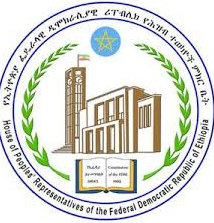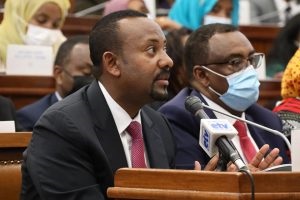
With its current term came to an end, the House of People’s Representatives is preparing to welcome new members following the successful 6th general election. The parliament that has been going through with jeers and cheers from the public is now undertaking different layers of reform ahead of its new term.
This week, the House of People’s Representatives managed to give a letter of recognition and awards for scholars that took part in reforming the House of Peoples’ Representatives.
Law professionals, who participated in preparing a law drafting system that helps preserve the reform outcomes, have been provided with recognition and awards.
On the occasion, Tagesse Chafo, House of the speaker, said, “As we managed to work hand-in-glove with scholars, we were able to get quite a lot of inputs that can transform the house.”
The award recipients, Dr. Elias Nuru and Shiferaw W/Michael, Zenebe Bulka, and Zekarias Erkola articulated their gratitude for what has been done to them.
As a matter of fact, the House of People’s Representatives has been getting themselves engaged in a wide variety of reforms that would help the house to rejuvenate itself and ensure vibrant parliament thereby helping meet the socioeconomic and political objectives of the country.
According to circumstances, members of the House of People’s Representatives have power over significant proceedings in the country in their term of office. Needless to say, apart from passing through multifarious jeers and cheers, the parliament was able to carry out their duties and responsibilities despite gaps to be bridged.
Much to the contrary, the House of People’s Representatives has been blamed for not vigorously participating in the country and reflecting the ideas, feelings, and thoughts of the population as a whole despite little improvement that has been witnessed.
In the same manner, as members of the House of People’s Representatives are considered as rubberstamp, attaining the intended target has not been achieved. On top of that, apart from complaining to the House of People’s Representatives for being under the influence of the decision-making body and dwindling to meet their accountabilities, some people claim that the former is prohibited them from cross-fertilizing a variety of ideas as they wished.
Professionals criticize the House of Peoples Representatives for being under the influence of the executive body and failing to meet their responsibilities in accordance with administrating the accomplishments of the latter.
In a previous interview with The Ethiopian Herald, Amdegebriel Admassu, a senior legal expert said regarding the issue, “Over the past years, there was a widespread violation of human rights, waste of resources, and corruption in our country. But, instead of following up on predicaments and getting them corrected, members of the parliament were largely silent and condoned such acts.
He went on to say, “The House of People’s Representatives were passing laws that go against the Constitution of the Federal Democratic Republic of Ethiopia time after time. Now we need members of the parliament who can put into words strong policies that can pull the country out of its current predicament.”
“We do need a visionary, educated, experienced, and patriot House of People’s Representatives downs the road. The new parliament must have a clear understanding of the politics of our country, the region, and the world.”
As a nation, we need members of parliament who are honest legislatures of the population as a whole who professionally architect the executive bodies, and who do a lot of work in terms of parliamentary diplomacy.”
Above and beyond, the government feels the necessity for making wider the political space with the intention of making the parliament where the various voices of the peoples are heard in an appropriate manner.
Back in the day, it has been claimed that members of the parliament were issuing repressive laws like anti-terrorism, media, and Civil Societies’ Organizations laws, and others. They were not reflecting the public’s interests that should be protected by these laws; it was the interest of a particular political party.
There is no gainsaying the fact that the country does need a parliament that not only makes laws but also enforces and oversees. The country as well needs a House of People’s Representatives that can fulfill their constitutional responsibilities. As to him, the MPs should act as their electorate, not as individuals. In other words, they need to be a true representative of their voters.
Many agree that the House should not be the property of a single political party if it is to generate ideas that benefit the country. “The political space needs to be widened and all parties should be given equal opportunity,” he insisted. He added, “In this regard, the role of government is very significant.”
As part of reforming the parliament, recently the First Annual Parliamentary Research Conference was held at UN Economic Commission Africa under the theme: “Parliament, Democracy, Good Governance, and Human Rights”.
It was learnt that the two-day conference was organized by the Secretariat Office of House of Peoples’ Representatives in collaboration with the United Nations Development Program (UNDP).
The Secretariat Office of the House of People’s Representatives also signed a memorandum of understanding with the member institutions of the Parliamentary Research Network (PRN) to work cooperatively in the fields of research and other technical works through the PRN.
It was also revealed that the main objective of the conference is to provide a platform for parliamentary research services to establish mutually beneficial partnerships for sharing best practices, information and knowledge; build the capacity of its members and promote evidence-based policies and legislations.
Establishing linkages between researchers and legislators, strengthening the capacity of legislative researchers through exchange and sharing of best practices, knowledge, and experiences; transforming research services uptake and evidence used for decision-making were among the very objectives of the conference.
“In line with the reforms that the House has undertaken for the past two years, the establishment of the Parliamentary Research Network is worth highlighting,” he noted.
He further indicated that the network will better facilitate for parliamentarians to closely access evidence-based data and analysis to better perform their duties in passing legislation and holding the government to account. On the other hand, it opens the House for the various academia, research institutions, and other relevant stakeholders to conduct useful research that will better equip the legislature, as to him.
Reliable facts and analysis contribute to a better understanding of problems, provide more realistic and effective legislative solutions to those problems, and can predict the impact of laws before they are adopted.
BY ADDISALEM MULAT
The Ethiopian Herald August 2021


